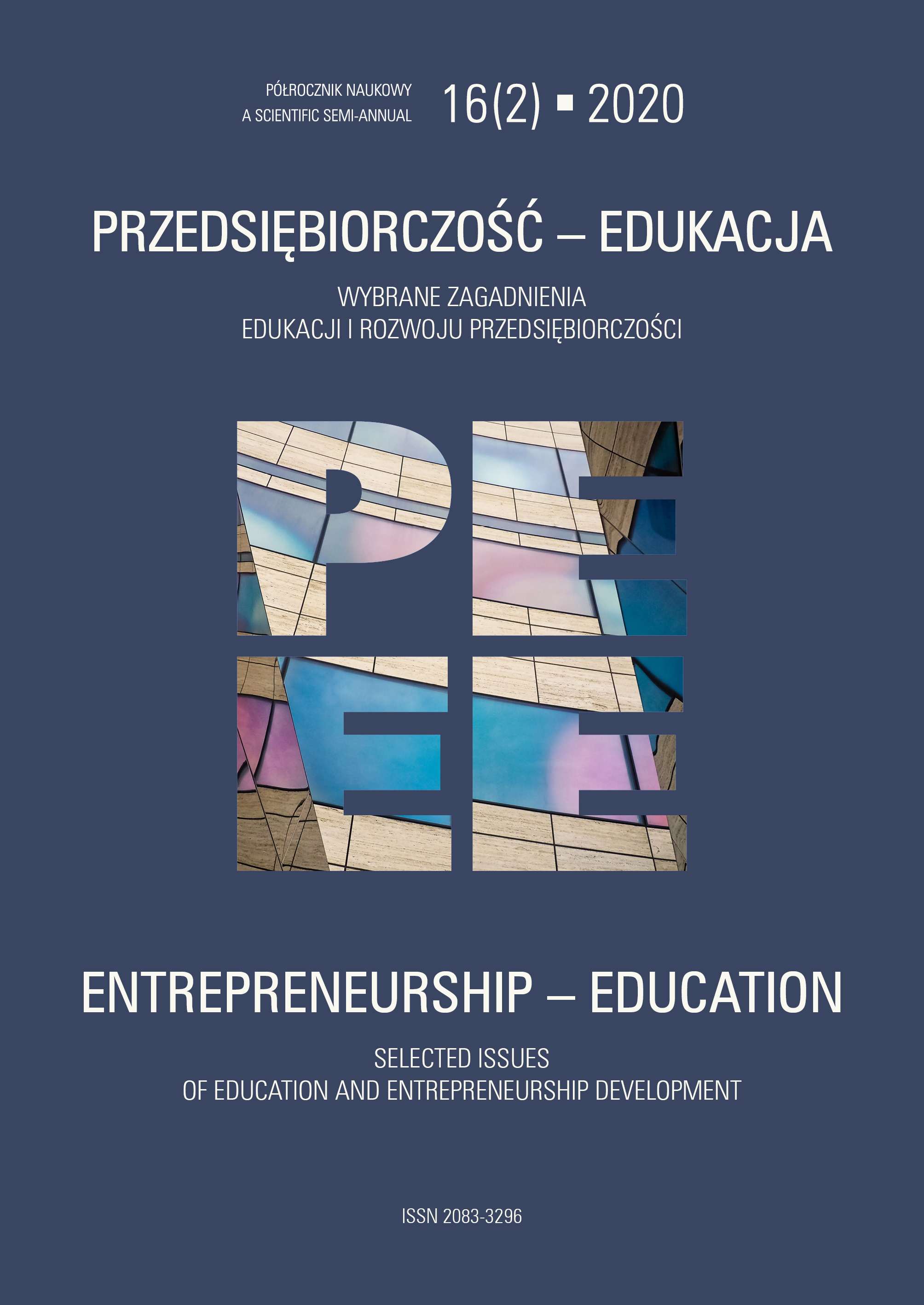Project-Based Learning in Entrepreneurship Education: a Case Study-Based Analysis of Challenges and Benefits
DOI:
https://doi.org/10.24917/20833296.162.7Słowa kluczowe:
case study, education, entrepreneurship, project-based learningAbstrakt
The Project-Based Learning (PBL) approach to teaching, although well-known, is still little used. However, its fundamental educational value is increasingly often emphasised, consisting of identifying real problems, shaping pro-active attitudes in students, and creating links between educational institutions and various types of external organisation. The article aims to present the challenges and benefits related to the teaching process in PBL based on the analysis of the LINCE project, implemented according to the same methodology simultaneously in Poland, Spain and Italy. Based on the results of the research and the literature review, recommendations are made regarding the possibility of broader use of PBL methodology in entrepreneurship education. The work is based on an exploratory research approach, using qualitative research methodology and case study technigue.
Bibliografia
Bransford, J.D., Brown, A.L., Cocking, R.R. (1999). How people learn: Brain, mind, experience, and school. Washington, DC: National Academy Press.
Brzozowska, A. (2016). Teorie przedsiębiorczości. In: Klincewicz, K. (ed.), Zarządzanie, organizacje i organizowanie – przegląd perspektyw teoretycznych. Warszawa: Wydawnictwo Naukowe Wydziału Zarządzania Uniwersytetu Warszawskiego, 459–471.
Condliffe, B., Quin, J., Visher, M.G., Bangser, M.R., Drohojowska, S., Saco, L., Nelson, E. (2017). Project-Based Learning. A Literature Review-Working Paper. MDRC. Retrieved from: http://live-buckinstitute.pantheonsite.io/sites/default/files/2019-01/MDRC%2BPBL%2BLiterature%2BReview.pdf
Dale, E. (1969). Audio-Visual Methods in Teaching. 3rd Ed. New York: Holt, Rinehart & Winston.
Dewey, J. (1938/1997). Education and Experience. New York: Touchstone.
European Commission. (2004, March). Aid delivery methods. Vol. 1. Project Cycle Management Guidelines. Europe Aid Cooperation Office. Retrieved from: https://ec.europa.eu/europeaid/sites/devco/files/methodology-aid-delivery-methods-project-cycle-management-200403_en_2.pdf
García, L.M, Cook, S., Łobacz, K., Matuska, E., Rosania, V., Santaniello, A., Colace, F., Santaniello, D. (2019). Illustrated Methodological Guide. LINCE. Retrieved from: https://drive.google.com/file/d/1K9eLoFeYWb7v1p_O1MjC8qy_OZizkXNv/view
Gartner, W. (1985). A conceptual framework for describing the phenomenon of new venture creation. Academy of Management Review, 10(4), 696–706.
Helle, L., Tynjälä, P., Olkinuora, E. (2006). Project-based learning in post-secondary education – theory, practice and rubber slingshots. Higher Education, 51, 287–314.
Holubova, R. (2008). Effective teaching methods – project-based learning in physics. US-China Education Review, 12(5), 27–35.
Krajcik, J.S., Shin, N. (2014). Project-based learning. In: R.K. Sawyer (ed.), The Cambridge handbook of the learning sciences. New York: Cambridge University Press, 275–297.
LINCE. (2019, 10 November). Retrieved from: http://proyecto-lince.com/pl/index.php
My PBLWorks. (2019, 10 November). 21st Century Skills Framework. Retrieved from: http://www.bie.org/object/document/21st_century_skills_framework
Pellegrino, J.W., Hilton, M.L. (2012). Education for life and work: Developing transferable knowledge and skills in the 21st century. Washington, DC: National Academies Press.
Peterson, B.W. (2012). Uncovering the progressive past: The origins of project-based learning. UnBoxed: A Journal of Adult Learning in Schools, 8. Retrieved from: http://gse.hightechhigh.org/unboxed/issue8/uncovering_the_progressive_past/
Ravitch, D. (2000). Left-back: A century of failed school reforms. New York: Simon and Schuster.
Ravitz, J., Blazevski, J. (2014). Assessing the role of online technologies in project-based learning. Interdisciplinary Journal of Problem-Based Learning, 8(1), 65–79.
Research Summary on the Benefits of PBL. (2019, 10 November). Retrieved from: http://www.bie.org/object/document/research_summary_on_the_benefits_of_pbl
Siemieniak, P., Rembiasz, M. (2019). Importance of knowledge in the process of shaping the entrepreneurial attitudes of young people. MATEC Web of Conferences 290, MSE 2019 13010. doi: 10.1051/matecconf /20192901 MSE 2019 13010
Spałek, S. (2011). Nauczanie przez projekty jako metoda kształcenia menadżerów XXI wieku zgodnie z zapotrzebowaniem przedsiębiorstw. Zarządzanie i Edukacja, 79, 5–11.
Stake, R.E. (1995). The Art of Case Study Research. Sage Publications Inc., Series NULL.
Sturing, L., Biemans, H.J.A., Mulder, M., de Bruijn, E. (2011). The Nature of Study Programmes in Vocational Education: Evaluation of the Model for Comprehensive Competence-Based Vocational Education in the Netherlands. Vocations and Learning, 4, 191–210.
The Difference Between Projects And Project-Based Learning. (2019, 10 November). Retrieved from: //www.teachthought.com/learning/project-based-learning/difference-between-projectsand-project-based-learning/
Thomas, J.W. (2000). A review of research on project-based learning. San Rafael, CA: The Autodesk Foundation.
Yin, R.K. (2017). Case Study Research and Applications: Design and Methods. SAGE Publications, Inc; Sixth edition.
What is Project-Based Learning (PBL)?. (2019, 10 November). Retrieved from: http://www.bie.org/about/what_pbl 27
Why Project Based Learning. (2019, 10 November). Retrieved from: http://www.bie.org/about/why_pbl
Zdonek, I. (2017). Wykorzystanie Project Based Learning w edukacji klasy kreatywnej. Zeszyty Naukowe Politechniki Śląskiej. Seria: Organizacja i Zarządzanie, 102, 407–422.
Pobrania
Opublikowane
Jak cytować
Numer
Dział
Licencja
Artykuły publikowane są zgodnie z warunkami licencji Creative Commons (CC BY-ND 4.0; uznanie autorstwa-bez utworów zależnych).

